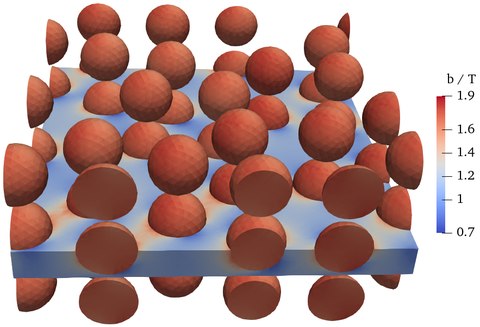DFG FOR 5599 - From the manufacturing process of structured magnetic elastomers to macroscopic material behavior
Data-based scale-bridging simulation of structured magnetorheological elastomers
Magnetorheological elastomers (MREs) consist of magnetic particles embedded in a soft elastic matrix. Under the influence of a magnetic field, they exhibit deformations and changes in stiffness. These effects are referred to as the magnetostrictive effect and the magnetorheological effect, and they are particularly pronounced in so-called structured MREs, where the particles are arranged in chain-like formations. Since the macroscopic material behavior strongly depends on the microstructure, this subproject within the DFG research group FOR 5599 addresses the modeling of MREs using a multiscale approach. First, the microstructure is characterized by means of statistical volume elements (SVEs). The SVEs are then subjected to magneto-mechanical loading, and the resulting macroscopic response is determined using finite element (FE) simulations and homogenization. The datasets obtained from the applied loads and corresponding material responses are subsequently used to train a macroscopic material model based on artificial neural networks (ANNs), which can be incorporated into macroscopic FE simulations. The goal of the project is to gain a deeper understanding of the relationship between microscopic structure and macroscopic material properties. At the chair, the following research tasks are being pursued:
-
Implementation of an algorithm for generating SVEs for MREs
-
Analysis of structure–property relationships in structured MREs
-
Development of an ANN-based macroscopic model for structured MREs

Magnetic induction on the microscale
Project staff
 © TUD/NEFM
© TUD/NEFM
Dipl.-Ing. Heinrich Tristan Roth
Send encrypted email via the SecureMail portal (for TUD external users only).
Chair of Computational and Experimental Solid Mechanics
Visiting address:
Zeunerbau, Room 355 George-Bähr-Straße 3c
01069 Dresden
Project management
 © TUD/NEFM
© TUD/NEFM
Professor for Computational and Experimental Solid Mechanics
NameProf. Dr.-Ing. habil. Markus Kästner
Send encrypted email via the SecureMail portal (for TUD external users only).
Chair of Computational and Experimental Solid Mechanics
Visiting address:
Zeunerbau, Room 353 George-Bähr-Straße 3c
01069 Dresden
Cooperations
DFG Forschungsgruppe FOR5599
Dr. Günter K. Auernhammer, Leipniz-Institut für Polymerforschung Dresden
Prof. Andreas Menzel, Otto von Guericke Universität Magdeburg
Prof. Stefan Odenbach, Technische Universität Dresden
Prof. Bianca Watzka, RWTH Aachen
Publications
Talks
- Data-Driven Multiscale Modeling of Magnetorheological Elastomers Using Physics-Augmented Neural Networks Roth, H. T., Gebhart, P., Kalina, K. A., Wallmersperger, T. , Kästner, M., 27 Mai 2025
- Multiscale modeling of structured magnetorheological elastomers using physics-augmented neural networks Roth, H. T., Gebhart, P. , Kalina, K. A., Wallmersperger, T. , Kästner, M., 9 April 2025
- Data-driven multiscale modeling of magnetorheological elastomers using physics-augmented neural networks Roth, H. T., Gebhart, P., Kalina, K. A., Wallmersperger, T. , Kästner, M., 11 Feb. 2025
